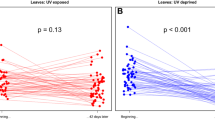Summary
In 1876, Darwin observed that tendrils of Pisum sativum oriented the long axis of their circumnutational sweep to keep it approximately normal to the direction of the sun's rays. Using various types of irradiation sources, the present study confirms Darwin's findings. Although blue light slightly increases the rate of circumnutation, only infrared irradiation (i.e. heat), effects the reorientation. The response can therefore be termed Diathermotropic. Diathermotropism in circumnutating tendrils is probably a device to bend the leaves of the elongating weak-stemmed plant away from the shade and toward the sun.
Similar content being viewed by others
References
Darwin, C.: The movements and habits of climbing plants, 2nd edn., revised. New York: Appleton 1876.
Hertel, H.: Structure, form and movement. New York: Reinhold 1966.
Jaffe, M. J., Galston, A. W.: Physiological studies on pea tendrils. II. The role of light and ATP in contact coiling. Plant Physiol. 41, 1152–1158 (1966).
Weis, J. S., Jaffe, M. J.: Photoenhancement by blue light of organogenesis in tobacco pith cultures. Physiol. Plantarum 22, 171–176 (1969).
Author information
Authors and Affiliations
Rights and permissions
About this article
Cite this article
Jaffe, M.J. On heliotropism in tendrils of Pisum sativum: A response to infrared irradiation. Planta 92, 146–151 (1970). https://doi.org/10.1007/BF00385207
Received:
Issue Date:
DOI: https://doi.org/10.1007/BF00385207




